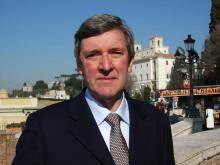At the end of every ordinary general assembly of the Synod of Bishops, the participants elect 12 of their members to the post-synod council, three from each continent (Asia and Oceania are counted as one). The pope appoints three more members from this same gathering to the council, a body that has taken on greater significance under Pope Francis.
This year the synod elected the following members: from Africa Cardinals Sarah (Guinea), Napier (South Africa) and Turkson (Ghana); from the Americas Archbishop Chaput (U.S.A.), Cardinals Maradiaga (Honduras) and Ouellet (Canada); from Asia-Oceania Cardinals Tagle (the Philippines), Pell (Australia) and Gracias (India); from Europe Cardinals Schönborn (Austria), Nichols (England and Wales) and Archbishop Forte (Italy).
It should be noted, however, that in the ballot for the third slot in both the Americas and Asia-Oceania the synod fathers actually voted for Archbishops Cupich (U.S.A.) and Coleridge (Australia). But since the synod rules allow only one person from each country to be elected to the council, the council’s secretary general, Cardinal Lorenzo Baldisseri, announced that Archbishops Cupich and Coleridge had to be eliminated. They were replaced by the next most-voted-for person in those areas, namely Cardinals Ouellet and Gracias.
Pope Francis appointed as the three additional members His Beatitude, Louis Raphaël I Sako, patriarch of Babylon of the Chaldeans and head of the Synod of the Chaldean Church (Iraq); Archbishop Carlos Osoro Sierra of Madrid (Spain); and Archbishop Sérgio da Rocha of Brasilia, president of the Brazilian Bishops Conference.
The task of the post-synod council is to assist the pope in the follow-up to the synod. It provides him with assistance, in particular, if he requires it, in the drafting of the apostolic exhortation that has traditionally been issued by the pope after every synod since 1974. The council also makes proposals to the pope regarding the theme for the next synod and assists in the preparation for that assembly by overseeing the drafting of the guidelines (lineamenta) and the working document (instrumentum laboris), as well as by suggesting the names of persons for the key roles in the next assembly.
The election to the council is always followed with great interest, and the results are scrutinized for several reasons. To begin with, they reveal the balance of forces within the assembly. This year that balance was between those perceived, on the one hand, as uncompromising defenders of the church’s traditional doctrine and against any opening on the three vexed questions, and those, on the other hand, who, while reaffirming this same church doctrine, are considered more open to exploring new horizons and new ways of understanding and presenting the Gospel message in a world that has changed radically, particularly in cultural terms, over the past quarter-century.
The election is watched closely also because it indicates which bishops have won the esteem of their peers at the synod. It is worth noting that three future popes emerged with strong votes at the synods in which they participated: Karol Wojtyla, Joseph Ratzinger and Jorge Mario Bergoglio.
There was one clear winner this year: Cardinal Luis Antonio Tagle, the archbishop of Manila and president of Caritas Internationalis. With 79 votes, he came at the top of the Asia-Oceania list, 19 votes ahead of the next most-voted-for prelates in all the continents—namely Cardinal Pell, who was elected in the number two position of that same list, and Cardinal Sarah, who topped the African list. Each received 60 votes. Archbishop Chaput came in the number one position for the Americas, and Cardinal Schönborn for Europe. Each obtained 53 votes.
The new council of the Synod of Bishops reflects the results of the voting on the final report of the 2015 assembly, where each of its 94 paragraphs was approved by more than a two-thirds majority. The final paragraph of that report asked the pope to consider writing a magisterial document on the family, and Pope Francis is now doing so. He writes quickly; and since he followed carefully the discussions at both the 2014 and 2015 assemblies, one can reasonably presume that he has a very clear idea of what he wants to say. He is under no obligation to consult the new synod council as he writes; but given his collegial style of government, one can expect him to do so.








